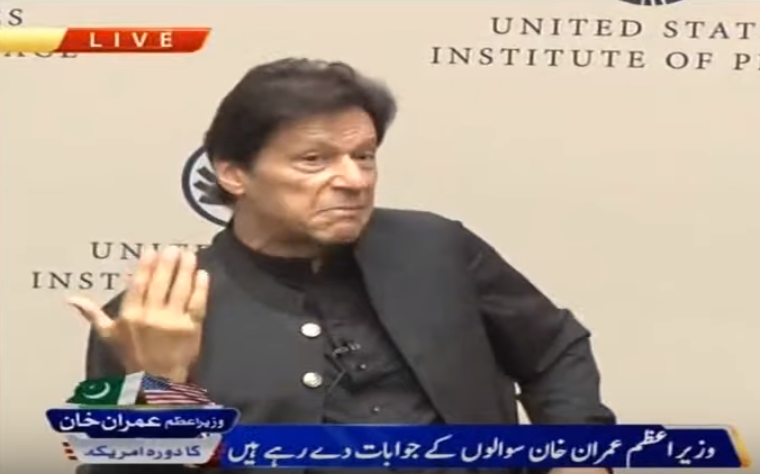RSF Slams Pakistani PM for Press Freedom Claim
The smarter way to stay on top of the multichannel video marketplace. Sign up below.
You are now subscribed
Your newsletter sign-up was successful
Pakistan's new prime minister, Imran Khan, told a U.S. audience last week that while his predecessor would have had journalists beaten up for some of the things they report, the press in his country is now freer than Britain's, the country's former colonial parent. (He also said during an Oval Office meeting with President Trump last week that Pakistan had one of the freest presses in the world).

Khan did suggest that was not necessarily a good thing, given that he said there was much inaccurate reporting. "What we need is to control the media, not through the government but through media watchdogs." He said that he was not talking about censorship, but about strengthening those media watchdogs. he even cited the love-hate relationship, mostly hate he added, between the U.S. press and President Trump, in talking about the allegedly inaccurate reporting on him by his own press.
Journalist groups, including Reporters Without Border (RSF), have warned that the President's characterization of the press as the enemy of the people provides cover for press censorship and harassment abroad.
During the Oval Office meeting and Q&A session, Trump and Kahn even joked about their respective treatment in the media.
When asked by a Voice of America reporter about what the reporter said were curbs on press freedom in his country, Kahn said to say there were any curbs was a "joke" and that the criticism he had received from his own press was "unprecedented. Trump suggested that was not possible. "There's now way you're treated worse than I am," he laughed, according to a White House transcript.
"It's worse than you," responded Khan. "I mean, that can’t be," said the President.
Following that exchange and Khan's appearance at an Institute of Peace event in Washington last week where he talked about the freedom of the Pakistani press, RSF wrote him a letter pointing to some examples that belie his claims.
The smarter way to stay on top of the multichannel video marketplace. Sign up below.
RSF Secretary General Christophe Deloire wrote: "It is clear that either you are very poorly informed, in which case you should urgently replace the people around you, or you are knowingly concealing the facts, which is very serious, given your responsibilities."
Deloire says press censorship and intimidation have gotten worse under Khan, not better.
Among Deloire's examples:
"Just a few hours after you landed in the United States, the leading Pakistani TV news channel, Geo News, was censored yet again. Your fellow citizens found a blank screen when they tried to obtain independent, public interest reporting about your trip from this channel.
"A month ago, a live Geo News interview with former President Asif Ali Zardari by the well-known journalist Hamid Mir was cut short after just a few minutes without any explanation. When contacted by RSF, the interviewer blamed you for this sudden and completely arbitrary act of censorship.
"The signals of three other Pakistani TV news channels, AbbTakk TV, 24 News and Capital TV, were suddenly suspended from cable TV services on July 8 without any warning to their management, and remained suspended for several days. Najam Sethi, a well-known journalist who often works with 24 News, confirmed to RSF that the suspension was a reprisal for their coverage of a press conference by Maryam Nawaz Sharif, another opposition figure."
And it is more than just censorship that is threatening, says Deloire:
"Ali Sher Rajpar, the president of the press club in Padidan, in southeastern Sindh province, was fatally shot five times at point blank range on May 4, shortly after unsuccessfully requesting police protection because he had been threatened in connection with his coverage of local corruption.
"Another Pakistani journalist, Malik Amanullah Khan, [alos president of a local press club] was gunned down in the Parowa area of Dera Ismail Khan district, in northwestern Khyber Pakhtunkhwa province.
"Muhammad Bilal Khan, a journalist and blogger whose YouTube channel had more than 50,000 followers, was hacked to death in an Islamabad suburb in June. One of his latest videos was about one of your speeches and, in one of his last tweets, he criticized your intelligence agency, Inter-Services Intelligence (ISI). The police have made no arrests in any of these three cases."
Deloire told Khan that to talk about press freedom in Pakistan, in light of those examples and more, was "tantamount to an obscenity."
Contributing editor John Eggerton has been an editor and/or writer on media regulation, legislation and policy for over four decades, including covering the FCC, FTC, Congress, the major media trade associations, and the federal courts. In addition to Multichannel News and Broadcasting + Cable, his work has appeared in Radio World, TV Technology, TV Fax, This Week in Consumer Electronics, Variety and the Encyclopedia Britannica.

